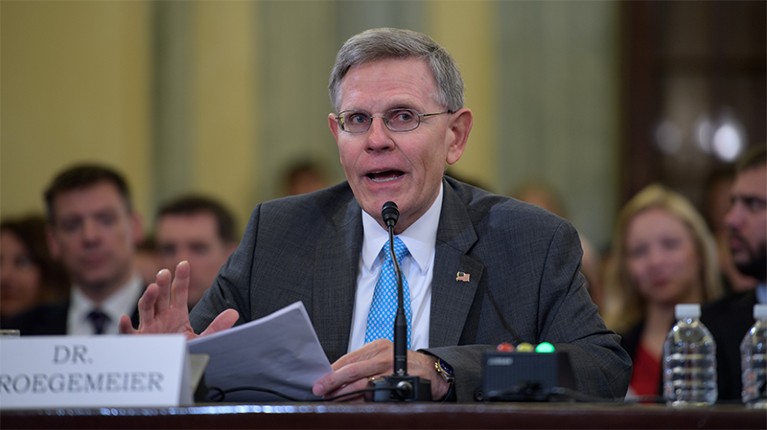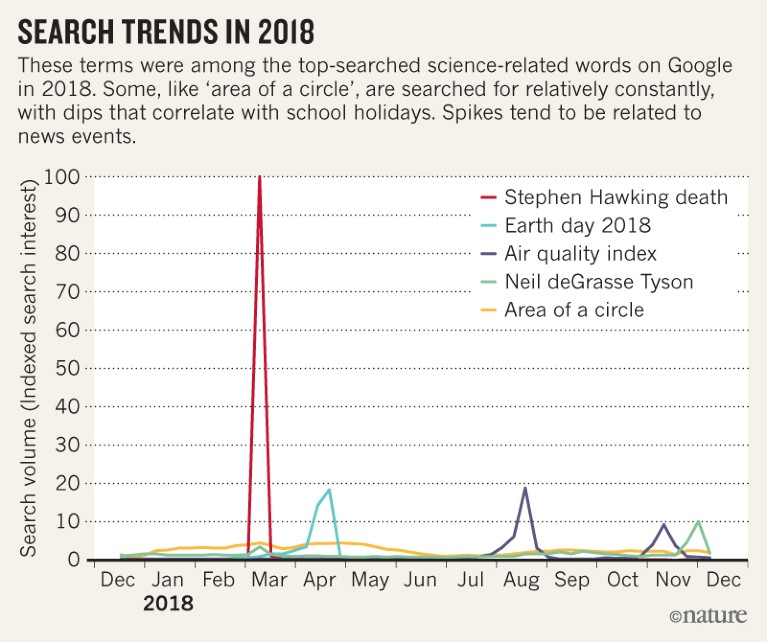PEOPLE
US science adviser in place at last Nearly two years after he took office, US President Donald Trump has a White House science adviser in place. The Senate confirmed meteorologist Kelvin Droegemeier for the job on 2 January. Droegemeier, an expert in extreme weather, is the first non-physicist to lead the White House Office of Science and Technology Policy (OSTP) since its creation in 1976. From 2009 until August 2018, he was vice-president for research at the University of Oklahoma in Norman. Trump went longer without a science adviser than any first-term president since at least the 1950s. It is not clear when Droegemeier will begin his new job, in light of the US government shutdown that began on 22 December. Droegemeier told Nature that he is consulting with the OSTP’s general counsel to determine how the shutdown will affect his position.

Kelvin Droegemeier is the first non-physicist to head the White House Office of Science and Technology Policy. Credit: Bill Ingalls/NASA
Biochemist cleared A Taiwanese court has cleared biochemist Wong Chi-huey of corruption. Wong, a former head of Taiwan’s foremost research institution, Academia Sinica, had been accused of accepting shares as a bribe for helping the Taiwanese biopharmaceutical firm OBI Pharma secure the rights to use enzyme-synthesis technology that he had developed. Wong denied he did anything illegal. On 28 December, the Shilin District Court found that there was insufficient evidence to suggest bribery. OBI Pharma chairperson Michael Chang was also cleared of corruption. Wong, who stepped down as the head of Academia Sinica in 2016 before he was charged, said in a statement to the media that prosecutors had misunderstood the enzyme-synthesis technology and the process by which rights to use a technology are transferred from an inventor to a secondary user. He said that he had offered his opinions on the technology only during the transfer process.
Institute director Germany’s Max Planck Society (MPS) has returned full management duties to an institute director who had been accused of animal-welfare violations. The move comes after a German court dismissed the case against neuroscientist Nikos Logothetis, a director of the Max Planck Institute for Biological Cybernetics in Tübingen, last month. The case related to alleged delays in euthanizing three sick research monkeys, and stemmed from complaints made by animal-rights activists. In February last year, a district court in Tübingen announced that it had issued three institute members, including Logothetis, with a penalty order — an accusation of a minor offence, combined with a fine, which automatically becomes a conviction unless appealed. Logothetis lodged an appeal, but the MPS temporarily removed some of his responsibilities and his right to carry out experiments with animals. Many researchers expressed concern that the MPS had imposed sanctions on Logothetis before his case had been heard in court. The MPS leadership countered that it needed to reassure the public that it took animal welfare seriously.
Science park Physicist Sylvie Retailleau has been appointed president of the University of Paris-Saclay — a cluster of research institutes at the Saclay science park southwest of Paris. She succeeds Gilles Bloch, who left to head the French biomedical research agency INSERM. Retailleau was previously president of the University of Paris South, the lead university in the cluster of 14 higher-education and research institutions at the Saclay science park. The Paris-Saclay project was originally envisaged by former president Nicholas Sarkozy as a ‘super-cluster’ of around 20 research institutes, but planning stalled because elite institutions known as grandes écoles were reluctant to lose their autonomy. Instead, two parallel clusters were formed last year at the behest of President Emmanuel Macron. The second cluster — made up of grandes écoles — is called NewUni and is led by the École Polytechnique.
EVENTS
Protected lands The responsibility for regulating and designating Indigenous territories as protected land in Brazil now rests with the country’s agriculture ministry. Brazilian President Jair Bolsonaro moved this authority from the National Indian Foundation — a government agency tasked with establishing policies related to Indigenous peoples — shortly after taking office on 1 January, despite protests before his election (pictured). Critics slammed the move, calling it a victory for industries that have pushed for greater access to protected lands for activities including logging and farming. Bolsonaro, a far-right politician, was once considered a long shot to win the presidency. But he capitalized on Brazil’s troubled economy and a long-running political-corruption scandal that landed a popular former president in prison in early 2018. Bolsonaro campaigned on cracking down on government corruption, as well as rolling back environmental regulations and promoting economic development.

Indigenous lands in Brazil may become more exposed to logging and farming despite protests.Credit: Eraldo Peres/AP/Shutterstock
POLITICS
Brexit warning UK universities have warned the country’s government that leaving the European Union without a deal is “one of the biggest threats” the institutions have ever faced. In an open letter on 4 January, leaders of groups representing 150 UK institutions urge the government to commit to replacing important EU sources of research funding that would become immediately inaccessible to UK researchers in the event of a ‘no deal’ Brexit. The UK government has committed to making up for some EU research funding — which mainly comes through the Horizon 2020 programme — but its pledges do not necessarily cover prestigious European Research Council grants and some parts of the Marie Skłodowska-Curie Actions programme, which promotes researcher mobility. The letter adds that the threat of a no-deal Brexit is already subjecting staff and students to significant uncertainty and could end up compromising research links, supply chains and travel.
SPACE
Wonky asteroid The New Year has yielded a new asteroid, with the discovery of an unusual space rock whose orbit is almost entirely inside that of Venus. Named 2019 AQ3, it is about 1.4 kilometres across and orbits the Sun once every 165 days, the shortest known orbital period of any asteroid. It was first spotted by the Zwicky Transient Facility, which surveys the skies from the Palomar Observatory near San Diego, California. The International Astronomical Union Minor Planet Center announced the discovery on 6 January.
BUSINESS
Pharma merger Two pharmaceutical leaders will merge in a US$74‑billion megadeal announced on 3 January. If the deal is approved by shareholders and regulators, Bristol-Myers Squibb of New York City will acquire Celgene of Summit, New Jersey, forming a company that earns more than $1 billion a year from nine of its products. With the expected launch of six more treatments, the combined company could increase that annual revenue to about $15 billion. Both companies have invested heavily in therapies for cancer, among other diseases, with Bristol-Myers Squibb pioneering two key cancer treatments that unleash the immune system against tumours.
TREND WATCH
Ever wondered what science terms people are searching for online? Data on global search patterns given to Nature by Google News Lab show which phrases were most popular in 2018. The list was topped with searches related to television shows (including The Big Bang Theory), films (such as Jurassic Park), companies (including 23andMe) and games (such as Jurassic World Evolution). Once these were filtered out, the top searches were mostly simple equations and constants, such as the speed of light or the area of a circle. The volume of such searches remains fairly constant throughout the year, but drops in certain months. This could be down to summer holidays, says Sam Walsh, trends curator at Google News Lab in London. “In fact, searches for the formulae peak in May — typically exam season,” Walsh says, noting that searches for the word ‘science’ follow a similar pattern. Other top searches included issues linked to news events such as Earth Day, and Stephen Hawking’s death in March. Astrophysicist Neil deGrasse Tyson is the only other scientist in the top ten searches.

Source: Google News Lab





